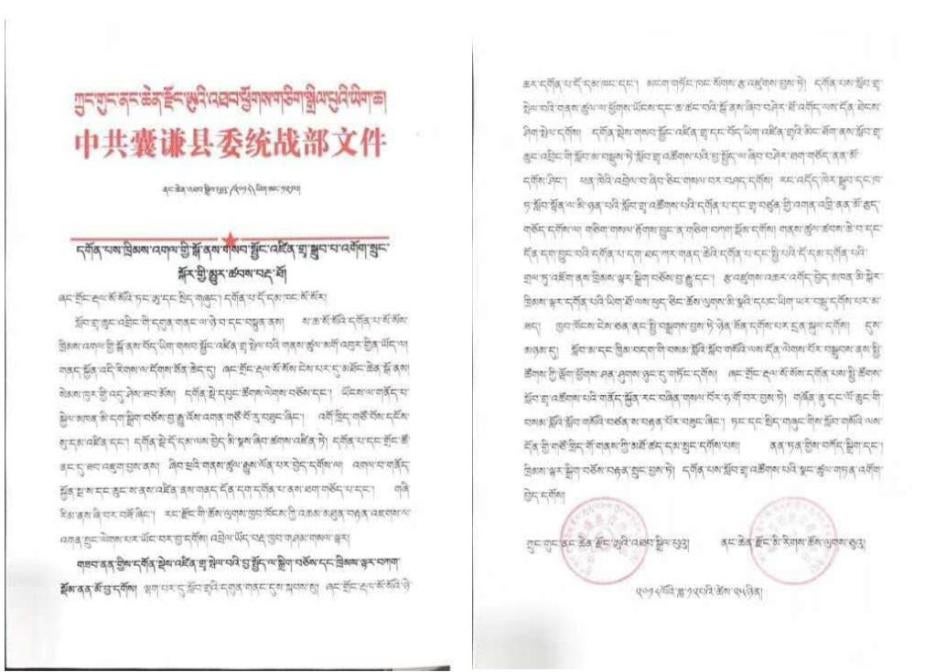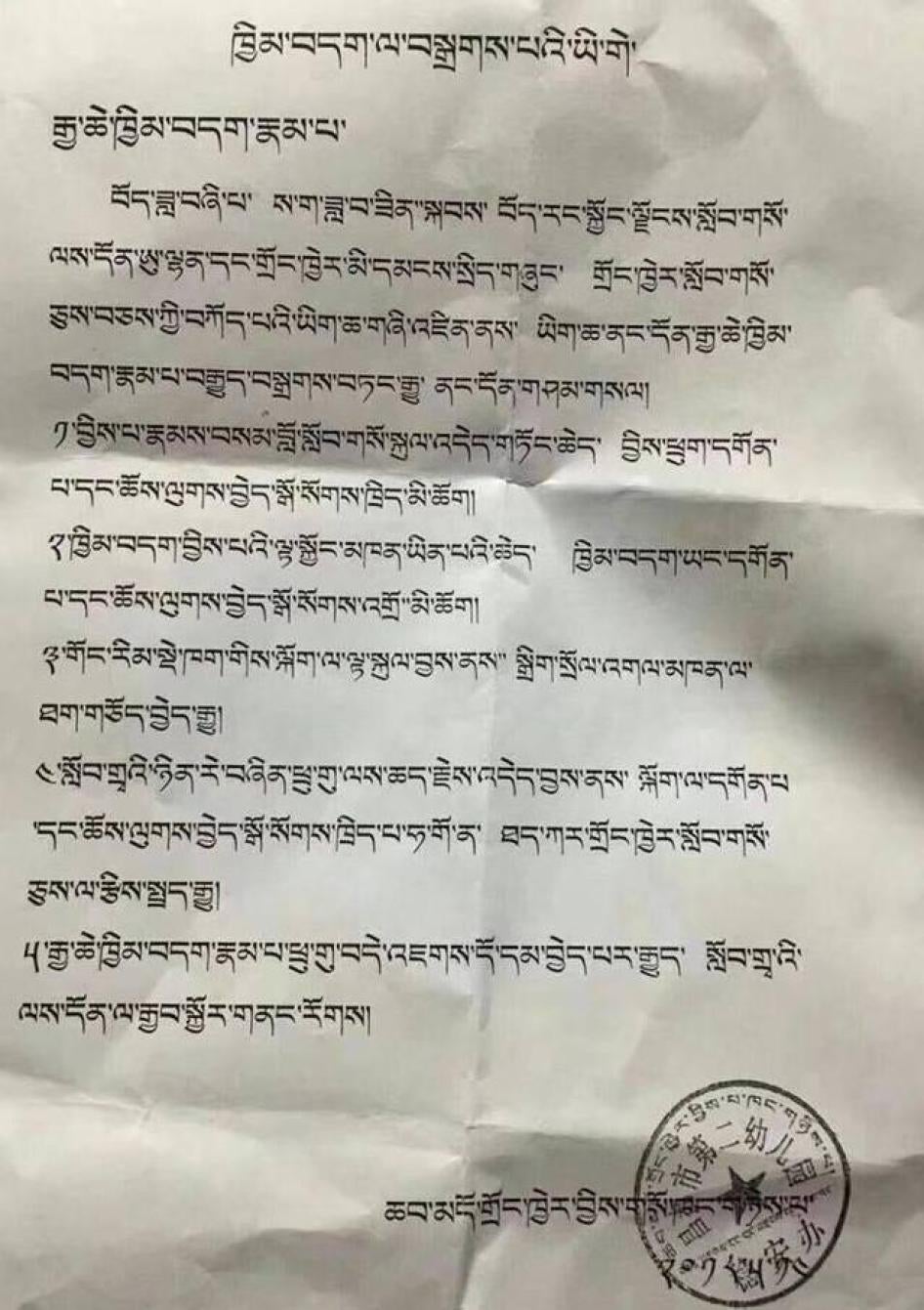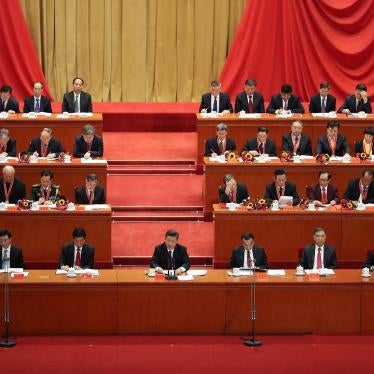(New York) – Chinese authorities in Qinghai province should immediately lift their ban on Tibetan children attending classes in local monasteries, Human Rights Watch said today. Informal classes taught by monks during school holidays have become popular in Tibetan areas, particularly to teach the Tibetan language, which is used progressively less in many government-run schools.
The ban in Qinghai’s Nangchen county, published in December 2018, is titled “Urgent notice concerning stopping illegal study classes in monasteries.” It describes informal classes run by monks as “ideological infiltration among the young,” “dangerous,” and “harmful.” It calls on local officials and Chinese Communist Party cadres responsible for managing monasteries to “understand the harmful nature of monasteries running open schools,” and to stop them from doing so.
“The official ban on informal Tibetan classes taught by monks violates a long list of basic rights, from education to cultural life,” said Sophie Richardson, China director. “Preventing Tibetan children from contact with monks and monasteries will only fuel Tibetan fears that China aims increasingly to restrict Tibetan culture and religion.”
The Nangchen ban, a copy of which Human Rights Watch obtained, conforms with earlier reports of similar bans in Tibetan areas. The language used suggests that officials are trying to stop schoolchildren from having contact with monks for even non-religious activities such as classes in Tibetan language. It also shows that officials are attempting to restrict children’s religious activities in eastern Tibetan areas such as Qinghai province. Previously, the restrictions applied only to schools in the TAR, where restrictions are generally tighter.
The ban is also the first known document issued directly by the Communist Party’s United Front Work Department, which oversees policy concerning minorities, that bans the participation of Tibetan children in religious activities. Previous bans on children attending religious activities had been issued by individual schools or the local education bureau.
School Notices
Human Rights Watch has copies of notices issued by four Tibetan schools in the last two years ordering parents not to allow their children to take part in religious activities or to visit religious places such as monasteries. A notice to parents from the Jebumgang Primary School in Lhasa, dated May 27, 2017, instructed them not to allow their children “to engage in any superstitious or religious activity” during the fourth month of the lunar calendar, when many Tibetans visit monasteries or perform religious rituals. The notice also ordered parents to “understand that they have a responsibility not to engage in [such activities] themselves.”
A similar school notice, issued on May 14, 2018, by a kindergarten in Chamdo, the third largest city in the TAR, warns parents that, “if your children miss any days of school, and are later found to have been secretly taken to a monastery or religious festival, your family will be reported directly to the city education bureau.” The notice said that the reason for the ban was to promote “critical thinking” in the children’s education and added that “the higher authorities will be covertly watching, and those who break regulations will be dealt with.”
A notice issued by an upper middle school in Lhasa, dated August 23, 2018, required parents to sign a compulsory “responsibility agreement” stating that “students must be stopped from attending various religious activities.” The notice said the agreement was needed because “the studies, health and mental wellbeing of the students must be properly guided” during the school holidays.
A copy of a Tibetan pupil’s printed exam score card from a school in Lhoka (Shannan in Chinese) municipality reported in exile media states that “during the winter holiday, your children may not participate in any kind of extra tuition classes or religious activity.” The exact date and source of the score card is uncertain.
Two Tibetans from Lhasa told Human Rights Watch in the past month that schoolchildren are restricted from involvement in religious activities. One reported that Tibetan schoolchildren “are discouraged from attending any religious events at any time.” The other said that in the past year, officials “have even ordered that Tibetan parents may not take their children to funeral rituals and weddings during school holidays.” He added that:
“If Tibetan students are found wearing prayer beads or blessing cords, or have mani or namchu wangden [mantras] or images of deities and lamas in their schoolbooks or bags, they are lectured and punished, or the parents are involved and they have to make a confession, political conduct points are deducted, and black marks given.”
Threatening Language
The language of the Nangchen ban indicates that officials suspect the purposes of the classes are for the monks to pass on religious or Tibetan nationalist ideas to the children. It orders officials to expel any monks from monasteries who are found to have organized informal classes in monasteries for local children “in the name of Tibetan classes or extra tuition.” This phrasing reflects the provincial-level police ban issued in the TAR in February 2018, that described unofficial Tibetan-language classes as a form of disguised political opposition to the government.
The Nangchen ban prohibits all classes taught at local monasteries in any subject, including Tibetan language classes. The promotion of Tibetan language and teaching is increasingly regarded by Chinese authorities in Tibet as a veiled form of political dissent. In May 2018, a Tibetan shopkeeper, Tashi Wangchuk, was sentenced to five years in prison for allegedly “inciting separatism” after he complained to foreign journalists about the lack of such teaching in his area.
China has ratified international conventions guaranteeing its citizens’ right to freedom of religious belief, and has specifically enshrined this right in its own constitution. The government has also promised not to deny children who belong to an ethnic, religious, or linguistic minority the right to enjoy their culture, profess and practice their religion, and to use their own language.
But in practice, authorities limit worship to what they define as “normal” religious activities, which it says are legal only if carried out by certain state-sanctioned congregations and institutions. In regions with populations that overwhelmingly practice a particular faith, such as Uyghur Muslims in Xinjiang or Buddhists in Tibet, restrictions are far more intrusive.
“Treating voluntary study classes during the holidays and family visits to temples as ‘dangerous’ reflects Beijing’s hostility toward Tibetans’ rights,” Richardson said. “That’s the real threat to Tibetans and China’s other religious minorities.”










